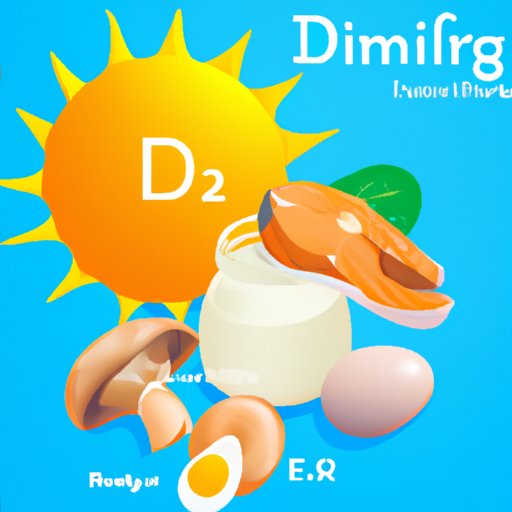Introduction
Vitamin D is a fat-soluble vitamin that is essential for maintaining healthy bones, teeth, muscles, and nerves. It is also important for proper immune system functioning and may help reduce the risk of certain diseases. While the body can produce its own Vitamin D when exposed to sunlight, there are also dietary sources of this important nutrient.

Five Foods High in Vitamin D for Optimal Health
The following foods are rich in Vitamin D and can help ensure you get enough of this important nutrient:
Fish
Fish, such as salmon and tuna, are excellent sources of Vitamin D. They are also high in omega-3 fatty acids, which have been linked to numerous health benefits, including improved heart health and reduced inflammation.
Mushrooms
Mushrooms are one of the few plant-based sources of Vitamin D. Certain types of mushrooms, such as maitake and portobello, are especially high in this nutrient. Mushrooms are also low in calories and high in fiber, making them an excellent addition to any diet.
Fortified Foods
Many processed foods, such as breakfast cereals and dairy products, are fortified with Vitamin D. These products are an easy way to increase your intake of this essential nutrient, but they may also contain added sugars and other unhealthy ingredients. Be sure to read the nutrition label before purchasing.
Egg Yolks
Egg yolks are another good source of Vitamin D. Eggs are also packed with protein and other essential vitamins and minerals, making them a nutritious addition to any meal.
Dairy Products
Dairy products, such as milk, cheese, and yogurt, are all rich in Vitamin D. Dairy products are also high in calcium, which is important for bone health. Choose low-fat or fat-free varieties to reduce your intake of saturated fat.

The Benefits of Vitamin D and What to Eat to Get It
Vitamin D plays an important role in many aspects of health, including bone and muscle strength, immune system functioning, and mental health. Here is an overview of the health benefits of Vitamin D and what to eat to get it:
Health Benefits of Vitamin D
Vitamin D helps regulate calcium and phosphorus levels in the body, which are important for strong bones and teeth. It also helps the body absorb calcium more efficiently, reducing the risk of osteoporosis. Vitamin D has also been linked to a lower risk of certain cancers, type 2 diabetes, and multiple sclerosis. Additionally, it may help improve mood and cognitive function.
Recommended Dietary Allowance of Vitamin D
The recommended dietary allowance (RDA) for Vitamin D is 600 IU (international units) per day for adults aged 19-70, and 800 IU per day for those over 70. It is important to note that these recommendations are for people living in the United States; other countries may have different RDAs for Vitamin D.

The Best Sources of Vitamin D
There are two primary sources of Vitamin D: sunlight and food. Sun exposure is the most efficient way to get Vitamin D, as the body is able to produce its own supply when exposed to ultraviolet light from the sun. However, it is important to avoid overexposure, as this can lead to skin damage and an increased risk of skin cancer.
Sunlight
Spending 15 minutes in direct sunlight several times per week is usually enough to get adequate Vitamin D. To maximize absorption, expose as much skin as possible without sunscreen. Keep in mind that the sun’s rays are strongest between 10 am and 3 pm, so aim to get outside during these hours.
Food Sources
In addition to sunlight, there are many food sources of Vitamin D. As mentioned above, fish, mushrooms, fortified foods, egg yolks, and dairy products are all excellent sources of this nutrient. Eating a variety of these foods can help ensure you get enough Vitamin D.
How to Get Enough Vitamin D Through Diet Alone
If you don’t get enough sunlight or cannot take supplements, you may need to increase your dietary intake of Vitamin D. Here are some tips to help you get enough of this important nutrient through diet alone:
Understanding Your Needs
Before increasing your intake of Vitamin D-rich foods, it’s important to understand your needs. Talk to your doctor about having your Vitamin D levels tested to determine if you need to make any changes to your diet. You can also use an online calculator to estimate your needs based on your age, sex, and lifestyle.
Eating a Balanced Diet
Once you know how much Vitamin D you need, you can focus on eating a balanced diet that includes a variety of Vitamin D-rich foods. Aim to include at least one of these foods in each meal or snack to ensure you get enough of this essential nutrient.
Supplements
If you find it difficult to get enough Vitamin D through diet alone, talk to your doctor about taking a supplement. There are many Vitamin D supplements available, so be sure to choose one that is right for you.
Conclusion
Vitamin D is an essential nutrient that plays a role in many aspects of health. While the body can produce its own Vitamin D when exposed to sunlight, there are also dietary sources of this important nutrient. Fish, mushrooms, fortified foods, egg yolks, and dairy products are all excellent sources of Vitamin D. Eating a variety of these foods can help ensure you get enough of this essential nutrient. Additionally, you can talk to your doctor about taking a supplement if needed.


